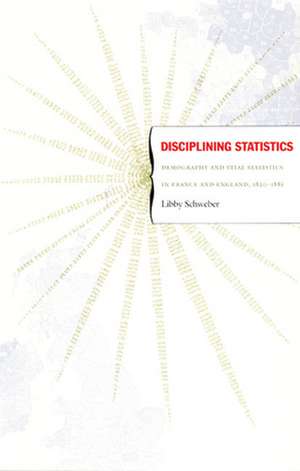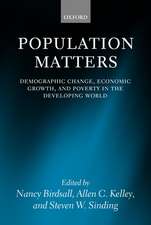Disciplining Statistics – Demography and Vital Statistics in France and England, 1830–1885: Politics, History, and Culture
Autor Libby Schweberen Limba Engleză Paperback – 27 noi 2006
Schweber recounts numerous attempts by vital statisticians and demographers to have their work recognized as legitimate scientific pursuits. While the British scientists had greater access to government policy makers, and were able to influence policy in a way that their French counterparts were not, ultimately neither the vital statisticians nor the demographers were able to institutionalize their endeavors. By 1885, both fields had been superseded by new forms of knowledge. "Disciplining Statistics" highlights how the development of "scientific" knowledge was shaped by interrelated epistemological, political, and institutional considerations.
Din seria Politics, History, and Culture
-
 Preț: 240.73 lei
Preț: 240.73 lei -
 Preț: 210.26 lei
Preț: 210.26 lei -
 Preț: 247.63 lei
Preț: 247.63 lei -
 Preț: 265.79 lei
Preț: 265.79 lei -
 Preț: 238.39 lei
Preț: 238.39 lei -
 Preț: 261.56 lei
Preț: 261.56 lei -
 Preț: 263.47 lei
Preț: 263.47 lei -
 Preț: 306.60 lei
Preț: 306.60 lei -
 Preț: 264.26 lei
Preț: 264.26 lei -
 Preț: 305.61 lei
Preț: 305.61 lei -
 Preț: 262.70 lei
Preț: 262.70 lei -
 Preț: 303.33 lei
Preț: 303.33 lei -
 Preț: 262.52 lei
Preț: 262.52 lei -
 Preț: 212.48 lei
Preț: 212.48 lei -
 Preț: 262.32 lei
Preț: 262.32 lei -
 Preț: 230.02 lei
Preț: 230.02 lei -
 Preț: 237.47 lei
Preț: 237.47 lei -
 Preț: 335.88 lei
Preț: 335.88 lei -
 Preț: 300.83 lei
Preț: 300.83 lei -
 Preț: 261.56 lei
Preț: 261.56 lei -
 Preț: 238.39 lei
Preț: 238.39 lei -
 Preț: 238.01 lei
Preț: 238.01 lei -
 Preț: 262.14 lei
Preț: 262.14 lei -
 Preț: 312.74 lei
Preț: 312.74 lei -
 Preț: 260.41 lei
Preț: 260.41 lei -
 Preț: 310.83 lei
Preț: 310.83 lei -
 Preț: 300.24 lei
Preț: 300.24 lei -
 Preț: 335.12 lei
Preț: 335.12 lei -
 Preț: 234.61 lei
Preț: 234.61 lei -
 Preț: 223.65 lei
Preț: 223.65 lei -
 Preț: 256.06 lei
Preț: 256.06 lei
Preț: 261.56 lei
Nou
Puncte Express: 392
Preț estimativ în valută:
50.06€ • 52.07$ • 41.32£
50.06€ • 52.07$ • 41.32£
Carte tipărită la comandă
Livrare economică 14-28 aprilie
Preluare comenzi: 021 569.72.76
Specificații
ISBN-13: 9780822338147
ISBN-10: 0822338149
Pagini: 288
Dimensiuni: 154 x 233 x 19 mm
Greutate: 0.39 kg
Ediția:New.
Editura: MD – Duke University Press
Seria Politics, History, and Culture
Locul publicării:United States
ISBN-10: 0822338149
Pagini: 288
Dimensiuni: 154 x 233 x 19 mm
Greutate: 0.39 kg
Ediția:New.
Editura: MD – Duke University Press
Seria Politics, History, and Culture
Locul publicării:United States
Notă biografică
Textul de pe ultima copertă
"Libby Schweber addresses both the institutional conditions of scientific change and the actual forms of knowledge produced. And she convincingly rejects the usual teleology of disciplines as what scientific practitioners always want and advanced states always need. She shows how the assertion of a discipline can be a sign of weakness, of inability to shape policy, really a course of action when all else fails."--Theodore M. Porter, author of "Trust in Numbers: The Pursuit of Objectivity in Science and Public Life"















